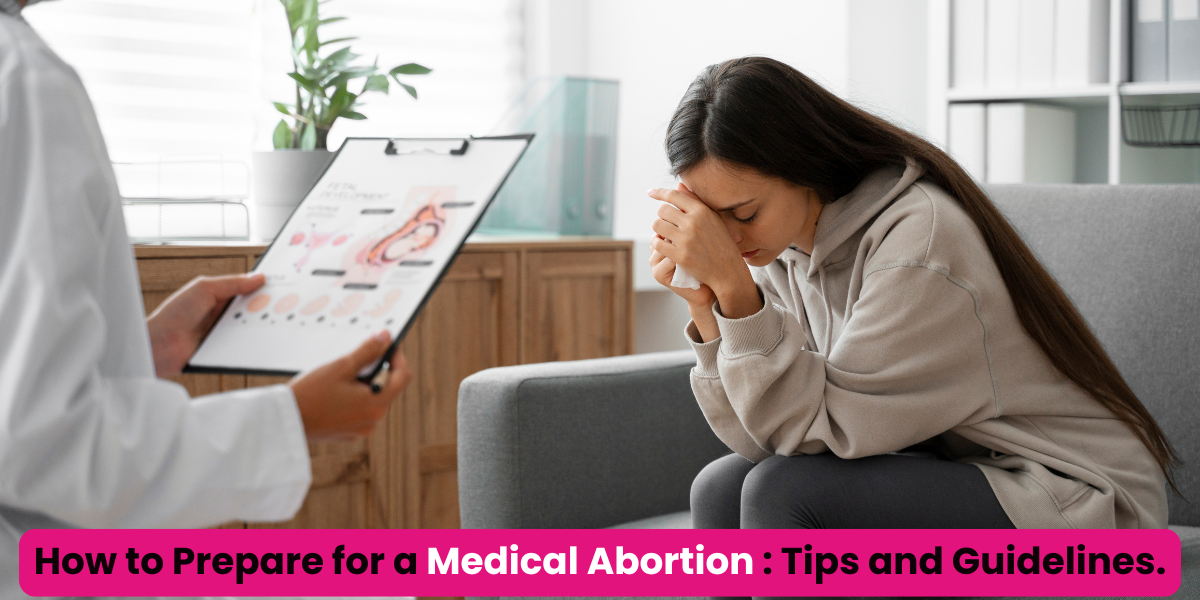How to Prepare for a Medical Abortion: Tips and Guidelines. Medical abortion is a non-surgical procedure used to terminate an early pregnancy, usually up to 10 weeks. Consulting with a specialist like Dr. Manisha Kulkarni, a Gynecologist in Magarpatta, Pune, ensures you are well-prepared for the process. Here’s a guide to help you navigate through this experience. What is a medical abortion? A medical abortion involves the use of medication to end a pregnancy, usually within the first 10 weeks. Two medications, mifepristone and misoprostol, are typically used in combination. The first pill stops the pregnancy from growing, while the second pill helps the uterus expel the pregnancy tissue. How do I prepare emotionally for a medical abortion? It’s important to prepare emotionally by talking to a trusted person, counselor, or support group about your decision. Consider your feelings and make sure you’re comfortable with the procedure. Having a strong support system in place can help reduce anxiety and stress. What should I expect during a medical abortion? During a medical abortion, expect to experience cramping, bleeding, and possibly some nausea. These symptoms usually begin a few hours after taking misoprostol. The process may feel like an intense period and can last several hours. It’s helpful to have access to a comfortable space, pain relievers (like ibuprofen), and sanitary pads. Are there any dietary guidelines before a medical abortion? There’s no strict dietary restriction, but staying hydrated and eating light meals before taking the medication is recommended. Some people prefer avoiding heavy or greasy food, as nausea is a common side effect. What should I wear for the procedure? Wear comfortable, loose clothing on the day of your medical abortion, especially since cramping and bleeding may make you uncomfortable. You may also want to bring a change clothes and use sanitary pads instead of tampons. What should I prepare for my recovery? Prepare your recovery area at home by having sanitary pads, painkillers, a heating pad for cramps, and plenty of water. You may feel fatigued, so arrange for someone to help with daily tasks if possible. Taking a couple of days off from work or other responsibilities can be helpful. Is it necessary to avoid certain activities before and after a medical abortion? Yes, avoid strenuous activities, such as heavy lifting or intense exercise, for at least a few days after the abortion. It’s also advisable to refrain from sexual intercourse or using tampons for up to two weeks to reduce the risk of infection. Can I drive myself home after a medical abortion? Although you may be physically able to drive after taking the first pill (mifepristone), it’s best to arrange for someone to drive you home after taking the second pill (misoprostol) since you might experience significant pain or discomfort. How long does it take to recover from a medical abortion? Recovery time varies, but most people feel physically better within a few days. Light bleeding can last for up to two weeks, and some cramping may persist. Your healthcare provider may schedule a follow-up appointment after a week or two to ensure the procedure was successful. How should I manage pain during a medical abortion? Ibuprofen is commonly recommended for managing pain and cramping. Avoid aspirin, as it can increase bleeding. In addition to medication, using a heating pad on your lower abdomen can also relieve discomfort. What follow-up care is needed after a medical abortion? Your healthcare provider will likely schedule a follow-up visit to confirm that the abortion was complete and to check your overall health. This can involve an ultrasound or blood test. If any complications arise, such as heavy bleeding, fever, or persistent pain, seek medical attention immediately. What are the signs of complications after a medical abortion? While complications are rare, signs to watch out for include: Excessive bleeding (soaking through two or more pads in an hour for more than two hours) Severe abdominal pain Fever lasting more than 24 hours Unusual or foul-smelling vaginal discharge If you experience any of these symptoms, contact your healthcare provider immediately. How soon after a medical abortion can I get pregnant? Ovulation can occur as soon as two weeks after a medical abortion, meaning it’s possible to become pregnant again quickly. If you want to avoid pregnancy, talk to your healthcare provider about contraception options. Is it normal to feel emotional after a medical abortion? It’s common to experience a range of emotions after a medical abortion. Feelings of relief, sadness, or guilt are all natural responses. Seek professional counseling if you’re struggling emotionally, as post-abortion counseling services are available to help you process your feelings. Preparing for a medical abortion involves both physical and emotional readiness. Ensure that you have all necessary medications, a comfortable recovery space, and a support system in place. If you have any doubts or concerns, don’t hesitate to reach out to Dr. Manisha Kulkarni, your gynecologist in Magarpatta, Pune, for guidance.


